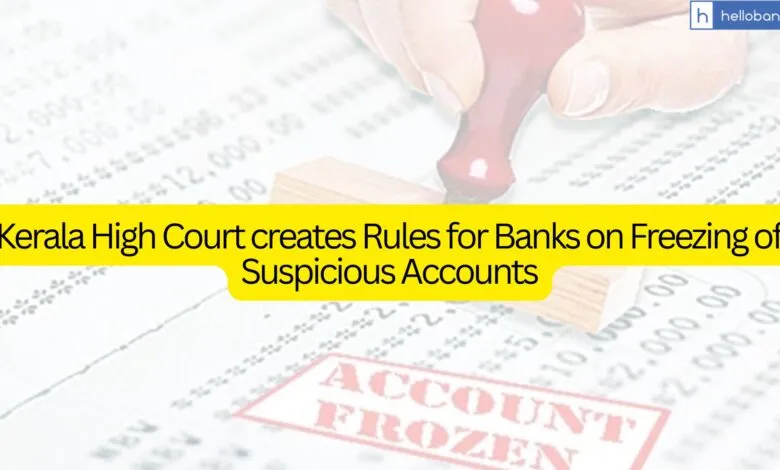Kerala High Court creates Rules for Banks on Freezing of Suspicious Accounts, orders RBI to create SOP

The Kerala High Court has issued detailed guidelines allowing banks to temporarily freeze suspicious customer accounts, even without prior notice. The Court also directed the Reserve Bank of India (RBI) to create a full Standard Operating Procedure (SOP) for banks on how to handle suspicious accounts.
Justice M.A. Abdul Hakhim delivered the judgment while hearing two petitions filed by customers of South Indian Bank. Their accounts had been frozen because the bank found unusual transactions that did not match their declared income. Both customers said their transactions were genuine business activities and argued that the bank’s action was unfair.
The bank froze their accounts more than a year ago without any request from law enforcement agencies. Even now, no agency has asked for action, although the bank has already reported the suspicious activity and the freeze to the RBI. In its reply, the RBI said that banks do not have the authority to freeze accounts unless a law enforcement agency or a court issues a request.
The Court pointed out that cybercrimes are rising sharply, especially through digital payment systems like UPI. It stated that the RBI, as the country’s banking regulator, has a duty under Section 35A of the Banking Regulation Act to protect the financial system.
“The country is now flooded with cybercrimes involving the misuse of bank accounts. The RBI has wide powers under Section 35A to protect the banking system and the economy,” the Court said.
The Court directed the RBI to quickly prepare an SOP explaining when and how banks can freeze suspicious accounts.
“It is the responsibility of the RBI to create a proper SOP that clearly defines the powers of banks to freeze suspicious accounts to prevent financial cybercrimes,” the Court added.
The Court said that even though not all banks are public authorities, they still have a duty to help the government prevent financial crimes.
“Banks have a duty to ensure that no offence is committed using the accounts they hold. If banks do not act in time, they may also be considered to be helping the crime,” the Court said.
The Court reviewed RBI guidelines about freezing accounts for failure to update KYC details or for hiding information. It also examined whether banks have the right to freeze accounts when they find suspicious transactions. The Court concluded that the RBI guidelines identify suspicious transactions but do not clearly tell banks what action to take after identifying them.
It also noted that banks are reporting entities under the Prevention of Money-Laundering Act (PMLA). To ensure the purpose of the PMLA is met, banks must have the power to freeze suspicious accounts for a reasonable period without prior notice, if they have strong reasons for suspicion.
The Court then issued the following guidelines for banks:
- Banks may freeze debit transactions in an account immediately if there is reasonable suspicion.
- Banks must inform the account holder on the same day of freezing, through SMS and registered post.
- Banks must notify the jurisdictional Cyber Crime Police Authority as per RBI guidelines.
- The account holder may submit an explanation to the bank, and the bank must review it and decide within one week.
- If the account holder does not respond or the explanation is not satisfactory, the bank may continue the freeze for up to three months after informing the authorities.
- If the bank receives instructions from law enforcement agencies, it must follow them immediately.
- If no agency responds within three months, the bank must lift the freeze, inform the account holder, and then allow the account to operate or ask for its closure.
- The account holder can challenge the bank’s decision if the bank rejects the explanation without valid reason.
These guidelines will remain in force until the RBI publishes a formal SOP. The Court closed the petitions by directing South Indian Bank to immediately inform the authorities about the freeze and then follow the new guidelines from now on. The RBI was also ordered to prepare an SOP defining the powers of banks to freeze suspicious accounts to prevent financial cybercrimes.
The Court added that when an account is unfrozen, the bank may still ask the customer to close the account or freeze it again if it finds suspicious future transactions.
- Download Court Order PDF (This PDF is available for Premium Users Only. Click here to join premium)
